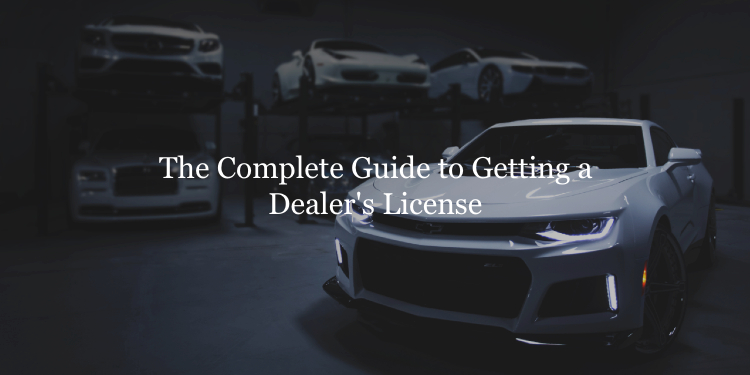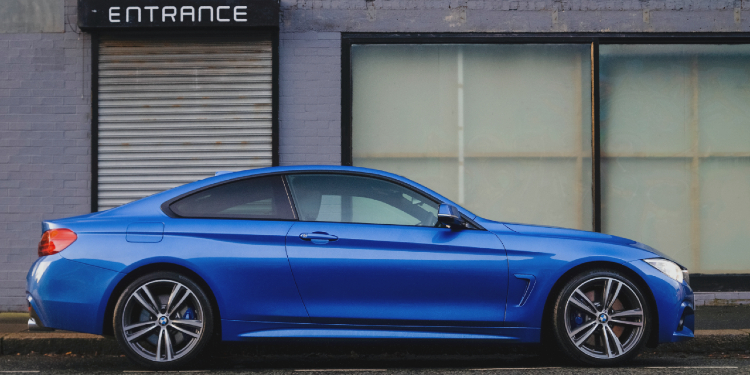How to Get Your Dealer’s License [Guide]

In most states, you need to get a dealer’s license if you want to sell more than a few vehicles per year. You will need to pick one of the following licenses, depending on the types of vehicles you want to sell:
- New dealer license (also known as franchise dealer license)
- Used car dealer license
- Wholesale dealer license
- Motorcycle dealer license
- Recreational vehicle dealer license
- Car auction license
To get licensed, you need to complete the license application process as it is determined by your state Department of Motor Vehicles (DMV). While this process varies from state to state, in most cases the requirements are fairly similar.
This guide will take you through the most common requirements you need to comply with when applying for your license. Keep reading for a detailed guide on how to get a dealer license!
1. Register a Business Entity in Your State
To apply for a car dealer license, you first need to register a business entity in your state. Businesses are usually registered with the Office of the Secretary of State.
If you don’t know much about business structures, see the Small Business Administration’s Guide. You should also consider getting legal help to determine which business entity structure is best for you, and the way you want to manage your dealership.
2. Choose The Type of Car Dealer License You Want to Get
Different dealer licenses allow you to sell different types of vehicles. The most common types of licenses are:
- New/Franchise – allows you to sell new vehicles to the public (some states allow new car dealers to also sell used vehicles)
- Used – allows you to sell used vehicles to the public
- Wholesale – allows you to sell vehicles to other dealers but not to the public
- Auto auction – allows you to hold auctions where vehicles are sold
- Motorcycle – allows you to only sell motorcycles
- Recreational vehicle – allows you to sell recreational vehicles (RVs) which may include snowmobiles, motorhomes, campers, and trailers
- Trailer – some states have a separate trailer dealer license
If you want to sell more than one type of vehicle, check with your local DMV if this is allowed in your state. In case you are allowed to have more than one type of dealer license, you will likely need to submit a separate application for each license type.
3. Meet the Dealer License Application Requirements
Once you’ve registered your business, you can proceed with applying for your license.
Each state has different dealer licensing requirements and procedures. However, the majority of these are quite similar. The list below includes the most common requirements for getting your dealer license:
- Find a suitable location for your dealership that meets local zoning ordinances
- Your dealership location will also need to comply with state DMV requirements regarding the size of the display area and office, the signage, working hours, and more
-
- Most states also require you to submit photographs of your location and its various elements and/or a floor plan, as well as proof of lease or ownership of the location
- Pass a dealership inspection
- Attend a dealer pre-licensing education course and/or pass an examination
- Complete the state dealer license application form
- Obtain an auto dealer bond
- Get liability insurance coverage
- Submit financial statements
- Complete a personal background history questionnaire and/or pass a criminal background check
- Sign and submit a franchise agreement (applies only to new dealers)
- Complete a dealer plates application form
Want to know how to get a dealer license in your state? Select your state below to see our detailed guides!

Auto Dealer Licensing Requirements By State
- Select Your State
-
Alabama
Alaska
Arizona
Arkansas
California
Colorado
Connecticut
Delaware
District of Columbia
Florida
Georgia
Hawaii
Idaho
Illinois
Indiana
Iowa
Kansas
Kentucky
Louisiana
Maine
Maryland
Massachusetts
Michigan
Minnesota
Mississippi
Missouri
Montana
Nebraska
Nevada
New Hampshire
New Jersey
New Mexico
New York
North Carolina
North Dakota
Ohio
Oklahoma
Oregon
Pennsylvania
Rhode Island
South Carolina
South Dakota
Tennessee
Texas
Utah
Vermont
Virginia
Washington
West Virginia
Wisconsin
Wyoming
4. Submit an Auto Dealer Bond
Most states require applicants for a dealer’s license to submit an auto dealer bond. It is a central requirement of the licensing process and you cannot get licensed without it.
This bond serves as a guarantee that the licensed dealer will comply with all state laws and regulations that apply to operating a dealership.
The amount of the dealer bond varies from state to state. In some states, it can be as low as $10,000, while in others it can be as high as $100,000 and more.
Want to know how much your bond will cost? Get a free and exact quote on your by completing the bond form below.

5. Submit Your License Application Packet and Pay a Fee
The final step you need to complete is to submit your license application form and all supporting documents, along with an application and/or licensing fee to your state DMV.
Usually, the DMV will take several days, up to several weeks, to review your application and verify all the information in it. If your application is approved, your license and dealer plates will be issued and you will be able to start working as a dealer.
6. License Renewal
Dealer licenses are typically issued for one or a maximum of two years. In some states, licenses expire on the same date on which they were issued, whereas in other states, all licenses expire on a certain fixed date.
Your DMV will inform you of the expiration date of your license as well as what requirements you need to comply with when applying for license renewal.
Frequently Asked Questions About How to Get a Dealer License
Here are some of the most common questions that new applicants for a car dealer license tend to ask.
How can I get a dealer license without a lot?
New and used auto dealers are always required to get a lot.
If you want to operate a dealership without having a lot, or display area, you need to get a wholesale dealer license and a car auction license. These licenses do not allow you to sell vehicles to the public though.
How much does it cost to get a dealer’s license?
The cost of getting licensed will vary depending on the type of license you pick and the state you are getting licensed in. Usually, the licensing cost is around a few hundred dollars.
Why do I need to pass a background check/provide fingerprints?
To issue a license, the DMV wants to be sure that it is issued to someone who will comply with the laws and act honestly. This is why you need to pass a background check.
Even if you have previous felonies or convictions, this does not mean that you can’t get licensed. The circumstances and details of these convictions are important.
Crimes related to motor vehicles or property are more likely to obstruct you in getting a car dealer license.

Can I use my home for a dealership?
Most states do not allow dealers to use their homes or any residential property for the purpose of running a dealership. Sometimes wholesale dealers are allowed to run their dealership office at home, as they may not require a display area.
In most cases, you will need to have a separate non-residential location for your dealership that complies with zoning ordinances.
New and used dealerships need to have an office area and a display lot. Sometimes dealerships also need to have a service area or a repair shop, unless they have an agreement with a nearby service facility.
What happens if I don’t renew my license in time?
If you fail to renew your license in time, in most cases, you can still submit your renewal application within a short period after the expiration date. Under these circumstances, however, you will need to pay a late renewal fee on top of your usual renewal fee.
If you are very late for your renewal, your license is likely to get revoked. If your license is revoked, you will need to start the licensing process from scratch, and may still have to pay a penalty fee!
What are dealer plates and why do I need them?
Dealer plates allow you to legally leave the lot with the cars that you own and are selling. In other words, you don’t need a separate registration plate for each car that you are selling. That way, your customers can test drive your cars.
The number of dealer plates that you are allowed to have varies from state to state. Usually, you will need to pay an additional fee for your dealer plates.




